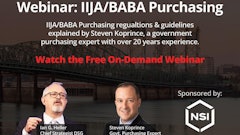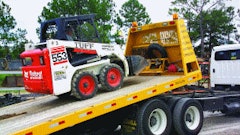
This article is an expansion of a blog I posted several weeks ago. The blog was an off-the-top -of-my-head thought dump that I pulled together in an airport while waiting to return home from a client's headquarters.
As the weeks passed by, the topic was pushed to the back burner as it didn't have a central role in anything I was working on. However, as my business partner and I started designing our top-secret, breakthrough tool for our upcoming membership site, the blog topic returned to the front burner as part of an intense and passionate debate.
In this article, I'm going to expand on several points relating to the evolution of a construction company - points that will hopefully give you greater clarity and direction for your own firm.
To bring you up to speed in case you didn't see the blog, here is the original post - posted July 23, 2008
What Problem Should You Fix First?
Recently, while trying to explain what my client and I had already achieved together and why we were getting ready to focus on something that didn't appear to be a pressing need, I stumbled upon a concept that you might find helpful with your business.What I knew, and my client was about to find out, was that despite having a six month backlog of work he didn't have any systems in place to ensure that he would have plenty of work at the end of the six months. He didn't understand why it was so important to address the situation now.
After stumbling around making various points and observations, it finally dawned on me that his business was straddling two different plateaus of performance and neither where the plateaus we are gunning for. I hurried over to the whiteboard and drew a little chart that showed the four possible stages of business.
- The Threat Stage
- The Stability Stage
- The Freedom Stage
- The Great Wealth Stage
A business will never reach the Freedom Stage while still facing serious threats. Another way of saying it is that a business must be fully stabilized before freedom is possible. Proven systems are what bring stability and eliminate threats.
In my client's case, we had just put the finishing touches on his operations management to reduce the odds of blown budgets and negative surprises. So, we had stabilized his operations.
What we hadn't stabilized was his sales and marketing. Hopefully you realize that ineffective sales and marketing systems are far more threatening to your financial health than are operations systems.
The point I'm trying to get across is that you can look at each one of the areas of your business and ask yourself "Have we put in place a system that greatly reduces our risk?"
If not, invest time to implement those systems. Working on the systems that are completely broken or missing will pay far bigger dividends than working on systems that are already functionally okay and realistically pose minimal risk.
Food for thought.
The Four Stages of a Growing Business
The two issues that Guy and I were batting around were the four stages, what they meant, and how contractors compare to everyone else. First of all, my titles for stages 3 and 4 are rather misleading. Allow me a moment to clarify them for you.
If a business owner is highly successful at building a business, a real business, he (or she)will get to stage 3: Freedom. He will have the freedom to work as much or as little as desired. Freedom from financial worry. Freedom to focus on activities that are outside of the business. Freedom to give back to the industry that gave him the opportunity to provide a comfortable lifestyle for his family. Stage 4, as I meant it to be, referred to the transition many successful business owners make: they become investors.
They start buying other businesses. They get into land development (the choice of many successful contractors). They take their business skills and apply them to as many opportunities as possible.
I named this stage in honor of a family friend who built a highly profitable company in the '70s and then started up a holding company that now owns around 10 businesses.
The "so what" about the four stages remains the same as in the blog post. Solidify everything in the stage you're in before focusing your efforts on the next stage. That way the rug will not be pulled out from under your feet.
Entrepreneur OR Small Business Owner
This is the subject Guy and I really had to compare notes on: entrepreneurism.
Most likely, you have come across Michael Gerber's book The E-Myth. Many contractors I run into mention it. The E-Myth thrust the term "entrepreneur" to the forefront of many a small business owners' minds.
What I have noticed over the last 12 years is that contractors rarely think like, nor picture themselves as, entrepreneurs. That's one of the things that separate contractors from almost all other small business owners. It's also the reason you should select professional advisors who have extensive construction background.
Here's the crazy part - not being overly entrepreneurial gives contractors a much better mindset for creating a stage 3 business.
True entrepreneurs bring an incredible intensity and passion to their business. Employees struggle to keep up with them. That drive and energy is great in the first two stages but usually becomes a road block to stage 3. The adjustment an entrepreneur must make in order to create a stage 3 business runs counter to his natural wiring.
Growth makes an entrepreneur's life harder. Conversely, growth tends to make a contractor's life easier. Well managed growth that is.
Larger contractors can afford to bring in specialists to perform the duties full time that the founder could only due part time. Those duties get done faster. Maybe not better, but certainly faster. (Remember, we're talking about well-run construction companies here.)
Most contractors think like small business owners. That serves them well in stage 2 and stage 3. However, a little touch of the entrepreneurial spirit sure comes in real handy during stage 1.
The Lesson - Act More Entrepreneurial
If you are in stage 1, challenge yourself to be more aggressive, more flexible, more creative, more customer focused. Think outside the box. Look for a way to change the rules of the game. Look for ways to take advantage of your competition's weaknesses. Learn to how to transition from small business owner to entrepreneur and back to small business owner.
That's what you'll need to do to build a stage 3 business and give yourself an opportunity to enjoy a stage 4 lifestyle!
Ron Roberts, The Contractor's Business Coach, teaches contractors how to turn their business into a profit spewing machine. To receive Ron's FREE Contractor Best Practices Newsletter visit www.FilthyRichContractor.com.


























